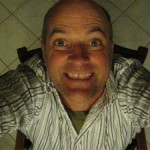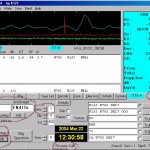Introduction:
- A sticky, stormy night in Texas, just right for podcasting and Russ' attempt to take over the MintCast.
Announcements:
- Pimpin' the band: Thanks, as always, to Gamma Leonis for the theme music for the show.
- We recently learned of Tom, KB4HQA's, unfortunate car accident after leaving the Dayton Hamvention this past May. We wish him a speedy recovery and return to podcasting.
- Richard is a fan of America's Test Kitchen.
Topics:
- Pimpin' the network: If you have a podcast and want to reach LHS listeners, please visit Black Sparrow Media and contact us to become a member! The Waveguides Podcast did and so can you.
- Who is your hero in amateur radio, living or dead? Let us know! Richard is gathering information for his super-secret project.
- Storm watchin and workin on radios. While a storm raged in Texas, Richard received an email about an IC-735 that would not power on reliably. Richard's trouble-shooting philosophy: start with the things that are cheap to replace.
- Richard is hoping to pursue a high-speed multimedia (HSMM) and mesh radio project using DD-WRT or OpenWrt for use in emergency communications. Used routers, such as the Linksys WRT54GL, are ideal and can be found for little money.
Feedback:
- Leif, KC8RWR, wrote to clarify a comment to episode 86, explaining that he'd like to try using an NE602 frequency converter to an RTLSDR radio to receive ham bands.
- Brian, G3XGY, heard Russ on the Mintcast and is looking forward to listening to episodes of LHS! Welcome, Brian.
- Leif, KC8RWR, offers a suggestion for Grant, who was having difficulty with the LHS live Linux CD handed out at Dayton. He thinks it may have been due to Linux not recognizing Grant's video card. Thanks, Leif.
- Harrison, VE2HKW, a sometime participant in MintCast, expresses his appreciation for episode 85, our interview with David Rowe and discussion of Codec2. Thanks, Harrison. Speaking of Codec2, Russ reports that David Rowe has won the 2012 ARRL Technical Innovation Award for his work on Codec2. Congratulations, David!
- Harrison, VE2HKW, wrote to ask for help with his Icom IC-735 (as mentioned above).
- Claudio of the LinuxBasement podcast thanks us for the mention in episode 87.
Contact Info:
- Contact Richard at kb5jbv@gmail.com, Russ at k5tux@lhspodcast.info, or both at the same time at info@lhspodcast.info.
- Listen to the live stream every other Tuesday at 8:00pm Central time. Check the LHS web site for dates.
- Leave us a voice mail at 1-909-LHS-SHOW (1-909-547-7469), or record an introduction to the podcast.
- Sign up for the LHS mailing list.
- Sign up for the MAGNetcon mailing list.
- LHS merchandise is available at the Merch link on Web site. Check out the Badgerwear or buy one of the other LHS-branded items at PrintFection.com/lhs or Cafe Press. Thanks!
- Thanks to Dave from Gamma Leonis for the theme music.
Music:
- "The Television Song" by Bryan Dunn, from the album Vicious Waltz, courtesy of Jamendo.
- "Total Breakdown" by Brad Sucks, from the album Out of It, courtesy of Jamendo.

